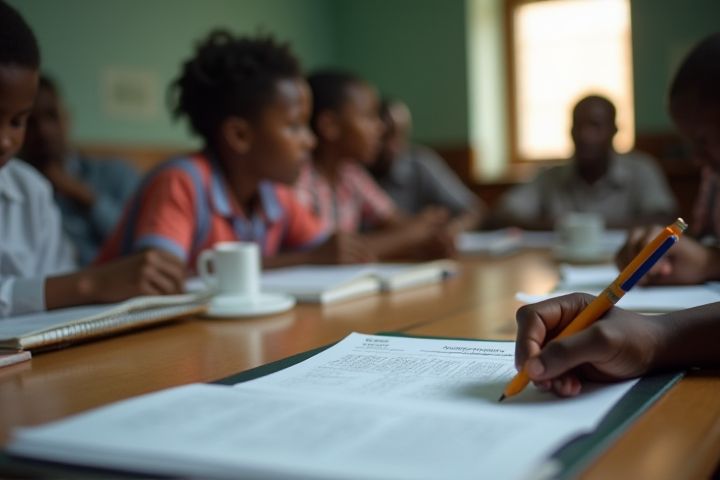
Education reform in Nigeria focuses on enhancing access to quality education and addressing systemic challenges within the sector. The Nigerian government has initiated various programs aimed at improving teacher training, curriculum development, and infrastructure in schools, particularly in rural areas. Efforts also emphasize the integration of technology and digital learning resources to engage students and improve educational outcomes. Community involvement plays a crucial role in these reforms, with local organizations partnering to promote awareness and support for educational initiatives. You can contribute to these efforts by advocating for policies that prioritize equitable access to education for all children in Nigeria.
Universal Basic Education initiative
The Universal Basic Education (UBE) initiative in Nigeria aims to provide free, compulsory, and quality education for all children aged 6 to 15 years, addressing major barriers to access. Implemented by the federal government, the UBE emphasizes improving infrastructure, teacher training, and learning materials to enhance educational outcomes. The initiative also prioritizes inclusivity, encouraging the enrollment of marginalized groups, including girls, children with disabilities, and those from remote areas. By promoting a foundational education system, the UBE seeks to empower the next generation, fostering national development and economic growth in Nigeria.
Curriculum standardization
Education reform in Nigeria emphasizes curriculum standardization to enhance teaching quality and learning outcomes nationwide. This initiative aims to establish coherent educational frameworks that align with global best practices while addressing local needs. By implementing uniform assessments and benchmarks, the reform seeks to bridge the knowledge gap and promote equity among students across different regions. Engaging educators and stakeholders in the development process ensures a more relevant and responsive educational system tailored to your community's specific challenges.
Teacher training policies
Education reform in Nigeria emphasizes comprehensive teacher training policies designed to enhance the quality of instruction in classrooms. These policies target the professional development of educators, integrating modern teaching methodologies and digital literacy to improve student engagement. By prioritizing continuous learning opportunities, the reforms aim to equip teachers with the skills necessary to meet diverse learning needs and foster critical thinking in their students. As a result, a better-trained workforce can contribute to advancing Nigeria's educational standards and overall socio-economic growth.
Technological integration
Education reform in Nigeria emphasizes the integration of technology to enhance learning outcomes and accessibility. This initiative aims to equip students with essential digital skills, preparing them for a globally competitive job market. Schools are adopting innovative teaching methods and resources, including e-learning platforms and interactive tools, to foster a more engaging educational environment. By prioritizing technological integration, Nigeria seeks to address educational disparities and promote inclusive growth across its diverse population.
Funding challenges
Nigeria's education reform initiatives address significant funding challenges hindering the sector's growth. Insufficient financial resources often result in inadequate infrastructure, lack of teaching materials, and low teacher salaries, affecting overall educational quality. Innovative funding strategies, such as public-private partnerships and increased government investment, aim to enhance accessibility and effectiveness in education. As these reforms progress, your support and involvement can play a crucial role in fostering a brighter future for Nigeria's youth and improving educational outcomes nationwide.
Infrastructure development
Education reform in Nigeria emphasizes critical infrastructure development to enhance learning environments across the nation. This includes the construction and renovation of schools, provision of modern classrooms, and the establishment of libraries and laboratories equipped with updated technology. By improving these facilities, the initiative aims to foster better educational outcomes and bridge the gap between urban and rural educational access. Your involvement in supporting these infrastructure changes can significantly impact the quality of education for future generations.
Public-private partnerships
Education reform in Nigeria emphasizes the importance of public-private partnerships (PPPs) to enhance educational quality and accessibility. These collaborations aim to leverage private sector innovation and resources alongside public funding to improve infrastructure, curricula, and teacher training. By integrating technology and modern teaching methods, PPPs strive to create a more dynamic learning environment that meets the diverse needs of students. Your involvement in supporting these initiatives can significantly impact the future landscape of education in the country.
Gender equality in education
Education reform in Nigeria emphasizes gender equality to ensure that both boys and girls access quality educational opportunities. The initiative aims to eliminate barriers such as cultural biases, economic constraints, and inadequate infrastructure that disproportionately affect female students. By implementing policies such as scholarships, awareness campaigns, and community engagement programs, the government seeks to promote female enrollment and retention in schools. The long-term vision is to create an inclusive educational environment that empowers all genders, fostering sustainable development and economic growth across the nation.
Inclusivity for special needs
Education reform in Nigeria prioritizes inclusivity to ensure that students with special needs receive equal opportunities in the academic environment. Legislative initiatives like the Nigerian Disability Act aim to eliminate barriers and promote accessibility in schools. Specialized training programs for teachers are being developed to equip them with the skills necessary to support diverse learning needs effectively. By fostering an inclusive education system, Nigeria seeks to empower all learners and enhance the overall quality of education across the nation.
Vocational and technical training focus
Education reform in Nigeria emphasizes vocational and technical training to equip students with practical skills relevant to the job market. This shift addresses the high unemployment rate by promoting hands-on learning experiences in various industries, including agriculture, construction, and information technology. Government initiatives, in collaboration with private sectors, aim to enhance the curriculum and infrastructure to provide better resources for skill development. By prioritizing technical education, Nigeria seeks to reduce the skills gap and foster economic growth through a more competent workforce.
